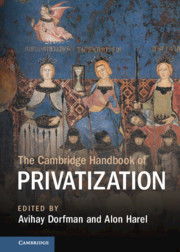Book contents
- The Cambridge Handbook of Privatization
- The Cambridge Handbook of Privatization
- Copyright page
- Contents
- Figures
- Tables
- Contributors
- Acknowledgments
- Introduction
- Part I On the Virtues of Public Provision (Agency-Based Approaches)
- Part II On the Virtues of Publicness as a Means to the Realization of Procedural Values (Process-Based Theories)
- Part III Outcome-Based Theories: On the Virtues and Vices of Public Provision as a Means to Promote Efficiency and Justice
- 11 Privatization of Legal Institutions
- 12 On Privatizing Police, with Examples from Japan
- 13 Privatization of the Police
- 14 Privatizing Private Data
- 15 Political Connections, Corruption, and Privatization
- 16 Privatization of Regulation: Promises and Pitfalls
- 17 Privatization of Accounting Standard-Setting
- Index
11 - Privatization of Legal Institutions
from Part III - Outcome-Based Theories: On the Virtues and Vices of Public Provision as a Means to Promote Efficiency and Justice
Published online by Cambridge University Press: 27 August 2021
- The Cambridge Handbook of Privatization
- The Cambridge Handbook of Privatization
- Copyright page
- Contents
- Figures
- Tables
- Contributors
- Acknowledgments
- Introduction
- Part I On the Virtues of Public Provision (Agency-Based Approaches)
- Part II On the Virtues of Publicness as a Means to the Realization of Procedural Values (Process-Based Theories)
- Part III Outcome-Based Theories: On the Virtues and Vices of Public Provision as a Means to Promote Efficiency and Justice
- 11 Privatization of Legal Institutions
- 12 On Privatizing Police, with Examples from Japan
- 13 Privatization of the Police
- 14 Privatizing Private Data
- 15 Political Connections, Corruption, and Privatization
- 16 Privatization of Regulation: Promises and Pitfalls
- 17 Privatization of Accounting Standard-Setting
- Index
Summary
The state and the law seem to be inextricably intertwined: The state is often identified with its legislative and adjudicative capacities. Law and legal institutions are likewise associated with public authority, conjuring the image of public courts and state law. But technological and social transformations, characterizing the modern age, pose a growing challenge to the connection between these two institutions. One type of challenge is posed by globalization, especially in this age of new information, which paves the way for legal transactions that traverse territorial boundaries and/or that occur in the stateless realm of cyberspace. Legal institutions whose jurisdictions are delineated according to geopolitical lines cannot adequately regulate behavior in a world in which physical-geographic location is gradually becoming irrelevant.
Keywords
- Type
- Chapter
- Information
- The Cambridge Handbook of Privatization , pp. 177 - 194Publisher: Cambridge University PressPrint publication year: 2021
- 1
- Cited by

